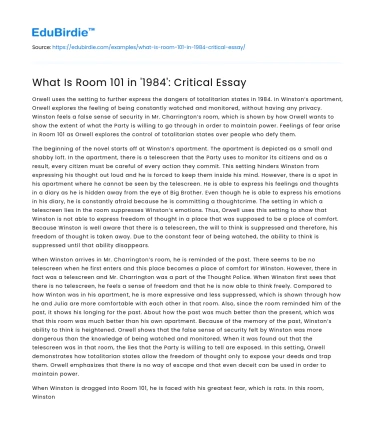Orwell uses the setting to further express the dangers of totalitarian states in 1984. In Winston’s apartment, Orwell explores the feeling of being constantly watched and monitored, without having any privacy. Winston feels a false sense of security in Mr. Charrington’s room, which is shown by how Orwell wants to show the extent of what the Party is willing to go through in order to maintain power. Feelings of fear arise in Room 101 as Orwell explores the control of totalitarian states over people who defy them.
The beginning of the novel starts off at Winston’s apartment. The apartment is depicted as a small and shabby loft. In the apartment, there is a telescreen that the Party uses to monitor its citizens and as a result, every citizen must be careful of every action they commit. This setting hinders Winston from expressing his thought out loud and he is forced to keep them inside his mind. However, there is a spot in his apartment where he cannot be seen by the telescreen. He is able to express his feelings and thoughts in a diary as he is hidden away from the eye of Big Brother. Even though he is able to express his emotions in his diary, he is constantly afraid because he is committing a thoughtcrime. The setting in which a telescreen lies in the room suppresses Winston’s emotions. Thus, Orwell uses this setting to show that Winston is not able to express freedom of thought in a place that was supposed to be a place of comfort. Because Winston is well aware that there is a telescreen, the will to think is suppressed and therefore, his freedom of thought is taken away. Due to the constant fear of being watched, the ability to think is suppressed until that ability disappears.
Save your time!
We can take care of your essay
- Proper editing and formatting
- Free revision, title page, and bibliography
- Flexible prices and money-back guarantee
When Winston arrives in Mr. Charrington’s room, he is reminded of the past. There seems to be no telescreen when he first enters and this place becomes a place of comfort for Winston. However, there in fact was a telescreen and Mr. Charrington was a part of the Thought Police. When Winston first sees that there is no telescreen, he feels a sense of freedom and that he is now able to think freely. Compared to how Winton was in his apartment, he is more expressive and less suppressed, which is shown through how he and Julia are more comfortable with each other in that room. Also, since the room reminded him of the past, it shows his longing for the past. About how the past was much better than the present, which was that this room was much better than his own apartment. Because of the memory of the past, Winston’s ability to think is heightened. Orwell shows that the false sense of security felt by Winston was more dangerous than the knowledge of being watched and monitored. When it was found out that the telescreen was in that room, the lies that the Party is willing to tell are exposed. In this setting, Orwell demonstrates how totalitarian states allow the freedom of thought only to expose your deeds and trap them. Orwell emphasizes that there is no way of escape and that even deceit can be used in order to maintain power.
When Winston is dragged into Room 101, he is faced with his greatest fear, which is rats. In this room, Winston feels trapped and weak compared to O’Brien. As Winston is sitting in a chair and faced with his greatest fear, Winston feels inferior to O’Brien who stands over him and has the power to control him. In this setting, Winston is helpless. In Room 101, the torture is not physical torture rather it seems to be more of a mental torture. The rats did not physically bite Winston, but the close proximity of the rats was enough to make him fearful of them. This shows that the only way for Winston to have the rat taken away from his face is to submit to O’Brien. The setting of the rat in his face and O’Brien’s large figure standing over Winston causes him to feel inferior and cower in fear. As a result, in this setting, Winston submits to O’Brien and proclaims that 2 + 2 = 5, even though such an equation is incorrect. However, this simply means that even if it is incorrect, if the Party says it is correct, the people have no choice but to obey. This shows that totalitarian states hold absolute power over everything including classifying what is correct and incorrect. Orwell shows the extent to which totalitarian states are willing to go in order to maintain power. It is not only through murder that they maintain power but it is through absolute respect to the Party. This makes it more dangerous because Orwell suggests that if the ability to think is completely taken away, society will decline and when the citizens completely submit themselves to the Party, they become puppets of the Party.
Orwell uses the setting to further express the dangers of totalitarian states in 1984. Orwell uses these settings to emphasize that totalitarian states are dangerous. He wants to emphasize that these states do not seek to find solutions for their people, but rather, they only seek to stay in power. Before consolidating power, they ensure the citizens that they will fulfill their promises but after consolidating power, they will do anything in order to maintain full respect from their citizens.






 Stuck on your essay?
Stuck on your essay?

